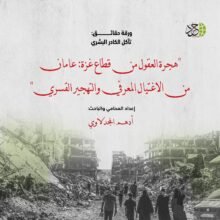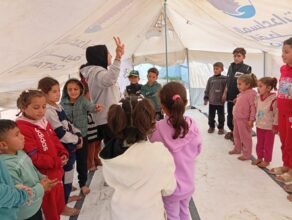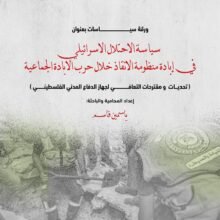
ICSPR Two Years After the Genocide… Gaza Faces an Unprecedented Humanitarian and Environmental Catastrophe Requiring Urgent International Intervention
November 11, 2025 – Gaza
Press Release
ICSPR: Two Years After the Genocide… Gaza Faces an Unprecedented Humanitarian and Environmental Catastrophe Requiring Urgent International Intervention
The International Commission to Support Palestinians’ Rights (ICSPR) has addressed an official briefing memorandum to a number of senior United Nations officials, highlighting the severe humanitarian and environmental deterioration in the Gaza Strip two years after the ongoing Israeli genocide that began on October 7, 2023. ICSPR warned that the Strip has turned into a completely devastated area — both environmentally and humanly — where more than two million people are living in conditions unfit for life.
The memorandum was sent to UN Secretary-General Mr. António Guterres, the UN Special Rapporteur on the situation of human rights in the occupied Palestinian territory Ms. Francesca Albanese, UNRWA Commissioner-General Mr. Philippe Lazzarini, the UN Special Rapporteur on the human right to a clean, healthy and sustainable environment Mr. David Boyd, UN High Commissioner for Human Rights Mr. Volker Türk, and Executive Director of the United Nations Environment Programme Ms. Inger Andersen.
In its memorandum, ICSPR expressed deep concern over the continued Israeli crimes against civilians in the Gaza Strip, affirming that what has been taking place for two years constitutes genocide, a crime against humanity, and a war crime in full form. These crimes are accompanied by a comprehensive environmental disaster resulting from the systematic destruction of infrastructure and the deliberate deprivation of essential services, including water, medicine, electricity, and a safe environment.
ICSPR explained that Gaza, which had a population of about 2.4 million before the aggression, now has only around 2.1 million people due to ongoing killings and forced displacement. More than 1.7 million people are currently internally displaced, living in destroyed schools, temporary shelters, and primitive tents lacking the most basic necessities of life.
The Commission reported that essential services have completely collapsed: electricity has been almost entirely cut off since the start of the aggression, more than 88% of groundwater wells have been contaminated, sewage is being discharged directly into streets and the sea, communication networks are disrupted daily, and municipalities, ministries, and banks have ceased functioning due to widespread destruction and mass displacement of workers.
According to the memorandum, internally displaced persons are enduring catastrophic humanitarian conditions, with an average of more than 15 people per room, a severe shortage of clean drinking water, food, and medicine, the spread of diseases and insects, and a total lack of privacy — making women, children, the elderly, and persons with disabilities the most affected.
ICSPR stressed that about 90% of Palestinian families in Gaza suffer from food insecurity, relying on scarce and insufficient aid. Acute malnutrition among children and infants has reached alarming levels, with more than 650,000 children at risk of dying from hunger due to food shortages, the lack of baby formula, and the deliberate targeting of food warehouses and relief kitchens by Israeli forces.
The Commission noted that more than half of Gaza’s hospitals and health centers are out of service — with 38 hospitals and 96 health centers completely destroyed — while the remaining few operate under dire conditions without medicine or fuel to power generators. Infectious diseases such as cholera, diarrhea, scabies, and severe malnutrition are spreading rapidly, compounded by the worsening mental health crisis caused by repeated trauma and the loss of family members.
ICSPR also warned of the severe environmental degradation caused by widespread bombardment, air, water, and soil contamination, decomposing bodies under the rubble, fuel and industrial waste leaks, and the accumulation of millions of tons of garbage and sewage, all creating fertile ground for epidemics. It also highlighted the danger of unexploded ordnance threatening civilians and rescue workers, and the deterioration of the coastal ecosystem due to the discharge of untreated sewage into the sea.
The memorandum further explained that the educational process has come to a complete halt after thousands of schools and universities were destroyed or turned into shelters, depriving more than 785,000 students of their right to education. More than 13,500 students and 830 teachers have been killed since the start of the aggression.
Economically, the Strip has witnessed an almost total collapse of productive, agricultural, and industrial sectors. More than 268,000 housing units and 94% of agricultural lands have been destroyed, raising poverty levels to 90% and unemployment to 75%. This has led to the disintegration of the social fabric and increased rates of domestic violence and suicide.
ICSPR emphasized that these facts constitute a grave violation of international humanitarian law, particularly Articles (49) and (50) of the Fourth Geneva Convention of 1949, and amount to war crimes and crimes against humanity under the Rome Statute of the International Criminal Court. They also represent a comprehensive act of environmental and human genocide under the 1948 Convention on the Prevention and Punishment of the Crime of Genocide.
The Commission called on the United Nations and its agencies to take immediate action to save what remains of life in the Gaza Strip, urging concrete and urgent measures including: an immediate cessation of the Israeli aggression; protection of civilians and civilian infrastructure; dispatching a special international investigation mission to document environmental and humanitarian violations and hold perpetrators accountable before the International Criminal Court; activating the role of the United Nations Environment Programme to assess environmental damage and develop an emergency plan to address pollution, debris, and waste; lifting the blockade on Gaza and allowing the unrestricted entry of fuel, water, and humanitarian and reconstruction materials; securing safe humanitarian corridors for the delivery of medical and food aid and for evacuating patients for treatment abroad; establishing an international fund for environmental and humanitarian reconstruction under UN supervision; imposing effective international sanctions on Israel, including an arms embargo and suspension of military cooperation; and recognizing what has happened in Gaza as an environmental and human genocide, ensuring accountability of those responsible before international justice.
ICSPR concluded its memorandum by affirming that protecting Gaza’s environment means protecting human life and dignity. It stressed that any further delay in international intervention will lead to irreversible environmental and health catastrophes affecting generations to come, calling on the international community to act urgently before it is too late.





